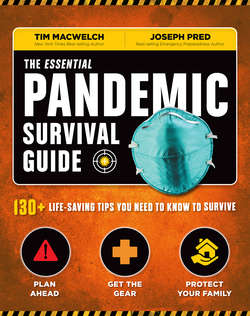Читать книгу The Essential Pandemic Survival Guide - Tim MacWelch - Страница 15
На сайте Литреса книга снята с продажи.
Оглавление05
With the news cycle being faster than ever, it’s important to recognize that sometimes the media doesn’t use scientific or medical terms correctly and that can cause confusion. To be well informed,you’ll do well to know the
basic terminology of pandemics.
CLUSTER A collection of cases occurring in the same place at the same time. If clusters are of sufficient size and severity,
they may be upgraded to an outbreak.
COMMUNITY TRANSMISSION The term for cases of infection in persons who haven’t traveled recently and have no connection to a known case. Also called “community
spread.”
CONTACT TRACING The practice of identifying and locating people who have been exposed to a known contagious person. They are then either asked to self-quarantine or
brought in for observation in order to prevent transmission.
CONTAGIOUS Transmissible by direct or indirect contact with an infected person or thing. For example, the coronavirus is both contagious and infectious. Anything that is contagious
is also infectious, but the reverse is not necessarily true.
DROPLET TRANSMISSION How a contagious disease is spread when it involves relatively large, short-range respiratory droplets produced by sneezing, coughing, or talking. Also
called “aerosol transmission.”
EPIDEMIC The rapid spread of disease to a large number of
people across a very large area within a short period of time.
FLATTEN THE CURVE This refers to the goal of slowing a virus’s spread to reduce the peak number of cases. This does not necessarily decrease the total number of cases; it just spreads them out over a longer period so that hospitals can cope with the number of patients at any given time rather
than being overwhelmed.
HERD IMMUNITY A form of community protection from a disease that occurs when a large percentage has become immune, whether through previous infections or vaccination, thereby providing some measure of protection
for individuals who are not yet immune.
INFECTIOUS Producing, capable of producing, or containing pathogens which can be transmitted. For example, food
poisoning is infectious, but it is not contagious.
UNDERSTAND THETERMINOLOGY
